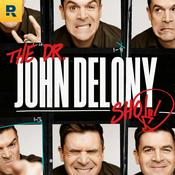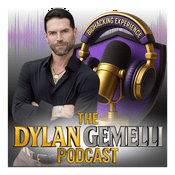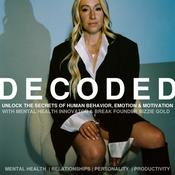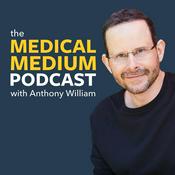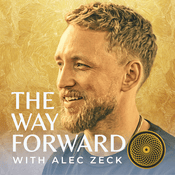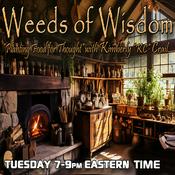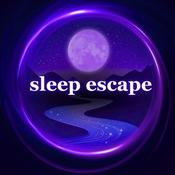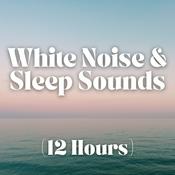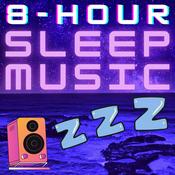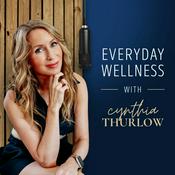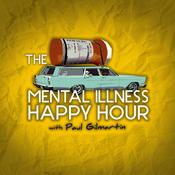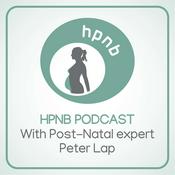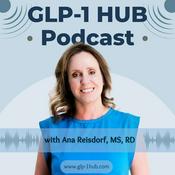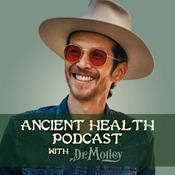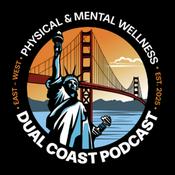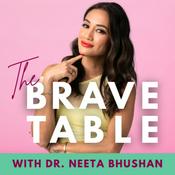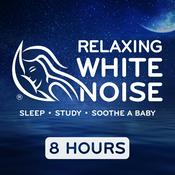Regulate & Rewire: An Anxiety & Depression Podcast
Amanda Armstrong
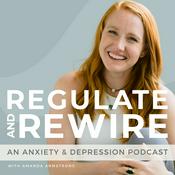
Latest episode
151 episodes
- Do you ever finish a conversation and realize you’ve just given a twenty-minute dissertation to justify a simple "no" or a basic need? In this episode, we’re peeling back the layers on chronic over-explaining. It turns out, this isn't just a quirky personality trait—it’s a sophisticated nervous system response. Whether you’re trying to preemptively defend yourself against being "the bad guy" or you learned early on that your needs weren't valid unless you built a legal case for them, this episode offers a roadmap to reclaiming your voice.
In this episode, you’ll learn:
The "Origin Story" of Over-Explaining: Why we learn to justify our needs to get them met and how misattunement in childhood creates a blueprint for hyper-communication.
Over-Explaining as a Survival Tool: The science of how your amygdala flags "emotional risk" and tries to negotiate safety through a flood of information.
The High Cost of Justification: How over-explaining leads to emotional exhaustion, self-abandonment, and the weakening of your own self-trust.
The "One-Sentence Rule": A practical challenge to state your truth clearly and then—the hardest part—stop talking.
Embracing the Pause: Why silence feels like danger to a dysregulated nervous system and how to tolerate the "awkwardness" of letting your words land.
3 Takeaways:
Over-explaining is a nervous system response, not a personality flaw. If you had to prove your feelings were valid in the past, your brain adapted by explaining itself into safety. You’re not "too much"; you’re practicing a survival skill that you no longer need.
The cost of over-explaining is self-abandonment. When you lead with a defense, you’re inadvertently saying your needs aren't legitimate on their own. Trusting your truth means realizing your "no" doesn't require a dissertation.
Practice the "One-Sentence Rule" and embrace the pause. Challenge yourself to say what you need in one clear sentence, then stop. Let the silence be there. People who truly see you don't need an essay to respect your boundaries.
—
Looking for more personalized support?
Book a FREE discovery call for RESTORE, our 1:1 anxiety & depression coaching program (HSA/FSA eligible & includes comprehensive bloodwork)
Join me inside Regulated Living, a mental health membership and nervous system healing space (sliding scale pricing available)
Order my book, Healing Through the Vagus Nerve today!
*Want me to talk about something specific on the podcast? Let me know HERE.
Website: https://www.regulatedliving.com/podcast
Email: [email protected]
Instagram: @amandaontherise
TikTok: https://www.tiktok.com/@amandaontherise - When you witness suffering at scale, your capacity to care can feel like it’s running on empty. In this episode, we’re diving into the biological reality of compassion fatigue and the potent "antidote" found in moral elevation. We discuss why "looking for the helpers" isn’t just a sweet sentiment—it’s a vital nervous system intervention that activates the vagus nerve and restores our ability to hope. This conversation is an invitation to honor your personal capacity, embrace complexity, and find your own sustainable way to show up.
In this episode, you’ll learn:
What compassion fatigue actually is
The "Compassion Budget"
The science of Moral Elevation: How witnessing acts of goodness triggers the vagus nerve to slow your heart rate, reduce inflammation, and release oxytocin.
Dialectical Thinking: The "both/and" logic that allows you to acknowledge horrifying truths without losing sight of community resilience.
Matching Capacity to Advocacy: Why "offering the shovel" is sometimes exactly enough, and how to match your current resources to the causes you care about.
3 Takeaways:
Compassion fatigue is real—and so is your capacity limit. Not every cause can be your cause. Ask yourself: What do I have to give right now? And where do I want to give it? Be honest about your capacity and kind to yourself about your limitations. Sometimes offering the shovel is enough.
Looking for the helpers activates moral elevation—a biological antidote to compassion fatigue.
Practice dialectical thinking: both/and, not either/or. Horrifying things are happening AND people are showing up for each other. You can witness harm AND witness helpers.
Resources mentioned:
Book: Healing Through the Vagus Nerve by Amanda Armstrong
—
Looking for more personalized support?
Book a FREE discovery call for RESTORE, our 1:1 anxiety & depression coaching program (HSA/FSA eligible & includes comprehensive bloodwork)
Join me inside Regulated Living, a mental health membership and nervous system healing space (sliding scale pricing available)
*Want me to talk about something specific on the podcast? Let me know HERE.
Website: https://www.regulatedliving.com/podcast
Email: [email protected]
Instagram: @amandaontherise
TikTok: https://www.tiktok.com/@amandaontherise - When the world feels like it's falling apart, how do we stay connected to ourselves while still showing up for what matters? In this episode, we're talking about collective trauma, what it actually means to be "regulated" (hint: it doesn't mean calm), and the tangible nervous system tools that can help you stay resourced during ongoing crisis. This isn't about fixing everything—it's about staying grounded enough to keep going.
In this episode, you'll learn:
What collective and vicarious trauma actually are, and how your nervous system processes witnessing suffering even through a screen
Why "regulated" doesn't mean calm—and what regulated activism actually looks like in practice
The neuroscience behind tools like predictability, warmth, and nostalgia as primitive safety signals for your nervous system
Why "tangible help kills the helplessness" and how micro-acts of care keep you connected and resourced
How to practice dialectical thinking: holding both the horror and the helpers at the same time
3 Takeaways:
Regulated doesn't mean calm—it means connected. You can be furious, heartbroken, and activated AND still be regulated. Regulation is about staying connected to your body, your breath, and your capacity to respond (not just react) while you feel all the feelings and fight for what matters.
Tangible help kills the helplessness. When everything feels too big and overwhelming, do something small and real. Drop off coffee for a neighbor. Text a friend "thinking of you." Bake bread and share it. These micro-acts of care aren't trivial—they're how we stay connected and resourced enough to keep going.
Look for the helpers—it's neuroscience, not toxic positivity. Witnessing acts of courage, kindness, and resistance activates your vagus nerve and counters compassion fatigue. Your nervous system needs evidence that while the monster is real, the protector is active too. Practice dialectical thinking: horrifying things are happening AND people are showing up for each other. Both are true.
Resources mentioned:
CLICK HERE to join my monthly release class. Use the code "REGULATE" for 100% off.
CLICK HERE to get 10% off my favorite phone boundary support (BRICK)
Post from @meghanbreentherapy
—
Looking for more personalized support?
Book a FREE discovery call for RESTORE, our 1:1 anxiety & depression coaching program (HSA/FSA eligible & includes comprehensive bloodwork)
Join me inside Regulated Living, a mental health membership and nervous system healing space (sliding scale pricing available)
Order my book, Healing Through the Vagus Nerve today!
*Want me to talk about something specific on the podcast? Let me know HERE.
Website: https://www.regulatedliving.com/podcast
Email: [email protected]
Instagram: @amandaontherise
TikTok: https://www.tiktok.com/@amandaontherise - New intro, repeat episode of one I published almost exactly a year ago. While the examples I offer are a year old, the suggestions offered apply just as much to some of the chaos we're all experiencing this week as well. Hit play on this episode again, see what resonates, and I'll be back next week with some new thoughts.
-
In this episode of Regulate & Rewire, we explore how to navigate collective trauma and maintain mental health in a world that feels increasingly chaotic. From California wildfires to global conflicts, we discuss why our ancient nervous systems struggle with modern information overload and offer practical strategies for staying regulated while staying informed. Learn about the concept of "conscious oscillation," tips for healthy information consumption, and why finding moments of joy isn't just allowed - it's necessary for sustained resilience and impact.
Three Takeaways:
Our nervous systems evolved for a world of immediate, local threats - not the constant stream of global catastrophes we now face through modern technology. Understanding this mismatch helps explain why we feel overwhelmed and gives us permission to set boundaries.
Balance Information and Regulation: Limit news consumption, take meaningful action when you can, and prioritize rest and joy to keep your nervous system balanced.
Finding joy and allowing moments of lightness during dark times isn't privilege or denial - it's a biological necessity for nervous system regulation. Conscious oscillation between engagement and rest helps us stay resilient and effective.
Website: https://www.regulatedliving.com/podcast
Email: [email protected]
Instagram: @amandaontherise
TikTok: https://www.tiktok.com/@amandaontherise - Why does “New Year, New You” feel so motivating… and then fall apart just weeks later? In this episode, we explore why New Year’s resolutions often backfire—not because you lack discipline or willpower, but because they ask your nervous system to do something it’s biologically wired to resist. Through a nervous-system and mental-health lens, we unpack why massive change feels threatening, how winter is a season of rest (not reinvention), and what a more sustainable, regulated approach to the new year actually looks like. This is an invitation to move away from pressure and performance—and toward safety, support, and gentle, lasting change.
In This Episode, You’ll Learn:
Why your nervous system resists big, fast change—and why that resistance is protection, not self-sabotage
How “New Year, New You” puts your body into threat mode and leads to burnout, not transformation
Why January is biologically a season for rest and reflection—not aggressive goal-setting
The four phases of the Resolution Crash: Mobilization, Sustainable Burn, the Crash, and the Shame Spiral
How to use "laughably small" habits to bypass your internal alarm system and create lasting change
3 Takeaways:
Resistance Is Protection
When your nervous system pushes back against change, it’s not because you’re broken—it’s because your body equates familiarity with safety. Change requires resourcing, not force.
Winter Is Not a Growth Season
Nature rests in winter, and so do we. Trying to overhaul your life in January asks your body to act like it’s spring—when it’s wired for conservation, reflection, and repair.
Measure Regulation, Not Performance
Lasting change doesn’t come from dramatic overhauls. It comes from tiny additions, moments of safety, and choosing regulation over all-or-nothing goals.
—
Looking for more personalized support?
Book a FREE discovery call for RESTORE, our 1:1 anxiety & depression coaching program (HSA/FSA eligible & includes comprehensive bloodwork)
Join me inside Regulated Living, a mental health membership and nervous system healing space (sliding scale pricing available)
Order my book, Healing Through the Vagus Nerve today!
*Want me to talk about something specific on the podcast? Let me know HERE.
Website: https://www.regulatedliving.com/podcast
Email: [email protected]
Instagram: @amandaontherise
TikTok: https://www.tiktok.com/@amandaontherise
More Health & Wellness podcasts
Trending Health & Wellness podcasts
About Regulate & Rewire: An Anxiety & Depression Podcast
Millions of people struggle with anxiety & depression every single day. Regulate & Rewire is where Amanda, a nervous system focused and trauma-informed practitioner, teaches you the lessons she learned on her healing journey and the tangible research-based tools she uses with clients everyday to help them regulate their nervous system & rewire their mind – in hopes of helping you do the same. Each episode features specific takeaways for you to apply to your healing journey today. Website: www.riseaswe.com
Podcast websiteListen to Regulate & Rewire: An Anxiety & Depression Podcast, We're Out of Time and many other podcasts from around the world with the radio.net app

Get the free radio.net app
- Stations and podcasts to bookmark
- Stream via Wi-Fi or Bluetooth
- Supports Carplay & Android Auto
- Many other app features
Get the free radio.net app
- Stations and podcasts to bookmark
- Stream via Wi-Fi or Bluetooth
- Supports Carplay & Android Auto
- Many other app features


Regulate & Rewire: An Anxiety & Depression Podcast
Scan code,
download the app,
start listening.
download the app,
start listening.




